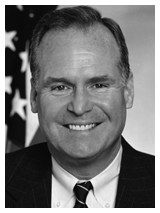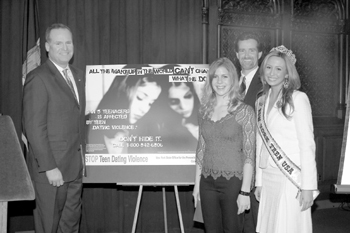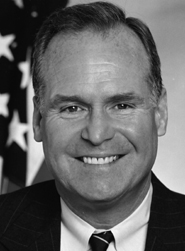|
Passage of Sexual Assault Legislation
Assembly passage of legislation targeting sex offenders during the 2005 legislative session was a good start in combating their heinous crimes. But more can – and should – be done to further protect New York’s women and children. Among the measures passed were two bills that originated in the minority conference: adding the amount of time a sex offender evades registration to the required registration time period, and closing the loophole allowing sex offenders who do not return the required annual address verification forms to escape punishment if they can prove they have not moved.
Over the last two years, S.A.V.E. - N.Y., the Assembly Minority Task Force on Sex Crimes Against Children and Women, has conducted hearings throughout the state and gathered testimony from law enforcement officials, crime victims and advocates. The resulting “zero tolerance” package was developed based on that testimony.
Earlier this month, Assembly minority members launched a statewide petition drive to convince majority members to act on civil confinement legislation and other measures to further protect New York’s children and women from dangerous sexual predators. Civil confinement would allow the courts to order the worst sex offenders held in secure mental health facilities beyond their prison release dates if, upon evaluation, there is significant reason to believe they may strike again.
Assembly minority members also propose the following measures to strengthen Megan’s Law:
-
Prohibit convicted sex offenders from living within 1,000 feet of a school or school grounds
-
Require the most dangerous sex offenders to wear electronic devices linked to Global Positioning System (GPS)
satellites to monitor their movements
-
Expand the information available about sex offenders on the Division of Criminal Justice Services’ Web site to
include information on all registered offenders
-
Require law enforcement to release information on Level 2 and 3 sex offenders – those at the highest risk of
committing additional crimes – to vulnerable populations in the community
-
Require lifetime registration for all sex offenders on the state Sex Offender Registry.
Fitzpatrick meets with Irish ambassador
The Honorable Eugene Hutchinson, ambassador and counsel general of Ireland to the United States, left, met
with the assemblyman and his intern, Annette Coughlan, of Kinsale, County Cork, in southern Ireland.
The ambassador, nearing the end of his assignment in the United States, was in Albany to discuss the current
relationship between the two nations.
Annette worked in Assemblyman Fitzpatrick’s Albany office for the legislative session. She’s in her third year of
studies at University College Cork, working toward a bachelor’s degree in government and public policy. The
opportunity to intern with the state Legislature allowed her to compare the Irish national government to New
York’s form of state government, which is one of several topics of her annual thesis.
Annette also volunteers with the Royal Navy Lifeboat Institution, a search-and-rescue service that works in
cooperation with the Royal Navy Coast Guard.
FITZPATRICK INTRODUCES LEGISLATION TO PROHIBIT HUMAN CLONING
I have introduced bipartisan and Senate-supported legislation that would prohibit the use of cloning technology
to initiate development of human beings at the embryonic stage of life and to prohibit human cloning for therapeutic
or reproductive purposes.
The distinction between therapeutic and reproductive cloning is a false scientific distinction because both begin
with the creation of a human being at the embryonic stage of life. The difference is that one is destined for implantation
in a womb and the other for destructive farming of its stem cells. Regardless of its ultimate destiny, all human embryos
are human beings. It is illogical and simply wrong to ban attempts at one form of cloning while allowing the other.
The Massachusetts-based biotechnology firm Advanced Cell Technology in 2001 announced it had cloned human
embryos. The company did not intend to implant cloned embryos for the purpose of creating life. According to a
statement from company officials, they sought only to create a new source of stem cells for research. Other scientists
and groups have announced they will try to produce children through human cloning.
This development has captured the public’s interest. Successful attempts at animal cloning have pushed the scientific
envelope, and the next progression may be the attempted cloning of a human. We are approaching a slippery slope and
once science has started down this path, we may not be able to reverse or stop it. That’s why I have proposed legislation
that would prohibit human cloning for scientific research and reproductive purposes.
“Given the grave moral uncertainty at this time, erring on the side of caution seems prudent,” urges Amy Campbell, JD,
a senior instructor in the department of psychiatry at the University of Rochester, and bioethicist. “This legislation strikes
the right balance between preserving human dignity and promoting science. And through it, we recognize that which is
all too often forgotten in these discussions: that science – as applied to society – is not value-free, and that the means
and not simply the ends of science matter.”
|

|
Scientists maintain there are three types of cloning technologies: recombinant DNA technology or DNA cloning;
reproductive cloning; and therapeutic cloning. DNA cloning is the transfer of a DNA fragment from one organism to a
self-replicating genetic element, and has been around since the 1970s. Reproductive cloning generates an animal
that has the same nuclear DNA as another currently or previously existing animal. Therapeutic, or embryo, cloning is the
production of human embryos for research. The goal of this process is not to create cloned humans, but to harvest stem
cells that are used to study human development and treat diseases.
This legislation in no way inhibits legitimate scientific research that could lead to diagnosis, treatment and prevention of
diseases and disorders, nor would it alter the legal status of gene therapy, cloning of plants and animals, cloning of human
organs for transplantation, or adult stem cell research.
Ward Melville and Kings Park
High School Students Honored
Assemblyman Michael Fitzpatrick (R,C,I-Smithtown), left, and state Sen. John J. Flanagan congratulate Kristen
Colasonno, center, winner of the Teen Dating Violence and Healthy Relationships Media Contest, as Miss New
York Teen 2005 Natascha Bessez looks on. Stony Brook resident Colasonno is a Ward Melville High School senior.
The contest, which promotes awareness of the seriousness of teen dating violence, was conducted by the Governor’s
Office for the Prevention of Domestic Violence (OPDV) and New York First Lady Libby Pataki. There were more than 180
entries from high schools around the state.
Colasonno displays her first-place poster, featuring a girl’s face leaning sadly against a mirror, with her reflection
showing a black eye and bruises. An edgy font provides the headline, “All the makeup in the world can’t change what he
does,” along with the sobering statistic that “1 in 5 teenagers is affected by teen dating violence.”
Students in class “talked about teen dating violence and about how to convey the idea of abuse,” said Colasonno.
“I thought that when you look in a mirror, you see everything. A mirror shows who you really are – you can’t hide the
abuse, physical or mental.” While she doesn’t see much physical violence in her school, Colasonno notes she sees
lots of controlling behaviors, such as boyfriends telling their girlfriends how to look and act.
The poster promotes the state’s toll-free Domestic Violence Hotline at (800) 942-6906. A smaller version of the poster
is being printed for distribution to high schools throughout the state. Copies will be available soon through the OPDV
Web site at www.opdv.state.ny.us. For more information,
call Suzanne Cecala at (518) 457-5744.
A group of SADD Club students at Kings Park High School in Suffolk County took home the top prize in the contest’s
music video category for a three-minute film, “Why Do I Have to Lie?” The students are Lauren Birkenhead, Kim Haggerty,
Ms. Kerrin Fitzpatrick, Amy Richards, Mr. Chris LoGalbo, Steven Smith, Timothy Rugile and Lisa Cullington. The song was
written and performed by former Kings Park High School student Steven Mecca.
|




